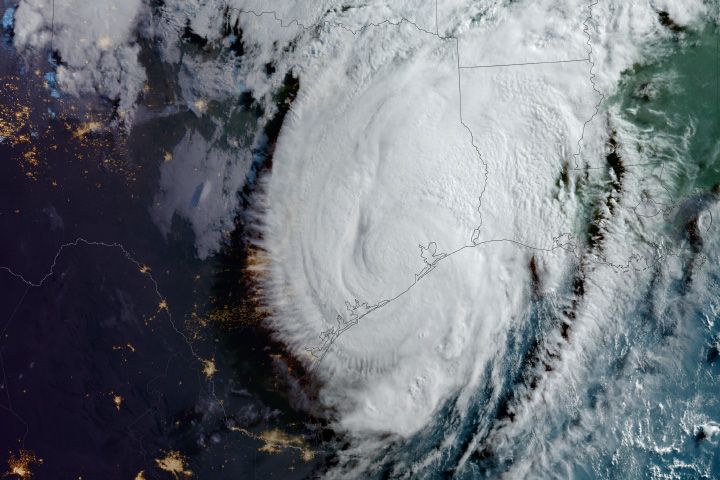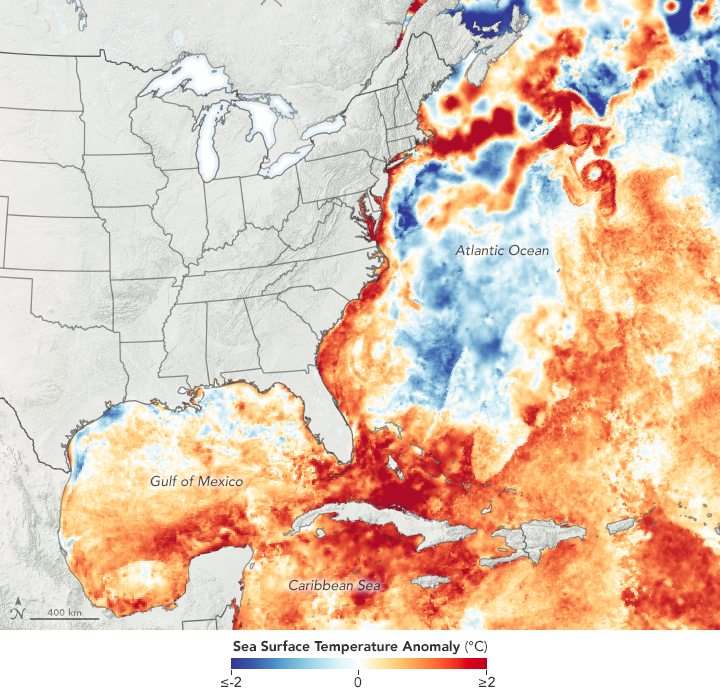The oceans are heating so fast, some scientists call for a new “Category 6” hurricane classification
By Oliver Milman | July 11, 2024
 Hurricane Beryl makes landfall in Texas, July 8, 2024. Image courtesy of NASA Earth Observatory
Hurricane Beryl makes landfall in Texas, July 8, 2024. Image courtesy of NASA Earth Observatory
Editor’s note: This story was originally published by The Guardian. It appears here as part of the Climate Desk collaboration.
Hurricane Beryl, which slammed into Texas on Monday after wreaking havoc in the Caribbean, was supercharged by “absolutely crazy” ocean temperatures that are likely to fuel further violent storms in the coming months, scientists have warned.
Beryl left more than 2 million people without power after making landfall near Houston as a Category 1 storm, after having rampaged through the Caribbean as a category 5 hurricane, with wind speeds reaching 165 miles per hour (265km/h), killing 11 people.
There has never been a category 5 Atlantic hurricane this early in the year before, with most major storms forming closer to September. Beryl, however, rapidly accelerated from a minor storm to a Category 4 event in just two days.
This deadly intensification was aided by unusually hot ocean temperatures along much of Beryl’s path, scientists say, with seawater heated by the climate crisis helping provide the storm with extra energy over the past 10 days.
“Beryl would be astounding to happen anyway, but for it to form in June is completely unprecedented,” said Brian McNoldy, a climate scientist at the University of Miami. “It’s just remarkable to see sea temperatures this warm. “I don’t think anyone would expect an outlier like this to happen, it exceeded expectations. With a climate-change influenced ocean, we are making extreme storms like this more likely to happen.”
While ocean temperatures around the world have been steadily marching upwards as the planet heats due the burning of fossil fuels, the past year has been “off the charts”, according to McNoldy. Last year was the ocean’s hottest on record, with marine heatwaves sweeping 90 percent of the globe’s oceans. This surge in heat has barely paused, with sea surface temperatures records tumbling every single day for 12 months in a row until March.
A slice of the tropical Atlantic stretching from Central America to Africa called the “main development region” is the main spawning area for most hurricanes and this stretch has been “amazingly warm” in recent weeks, McNoldy said. In places across the northern Atlantic, temperatures have been as much as 9 degrees Fahrenheit (5 degrees Celsius) above normal in the past month.
Ocean temperatures in the region typically peak in September or October but the extra heat has delivered such conditions unusually early this year. “In the Caribbean Sea it has actually been warmer than its usual peak since mid-May, which is absolutely crazy,” said McNoldy. “If the ocean already looks like it’s the peak of hurricane season, we are going to get peak hurricanes.”
Temperatures across much of the Gulf of Mexico, meanwhile, are “essentially as warm as bathtub water,” said Alex DaSilva, lead hurricane expert at AccuWeather. “Those warm waters are at the surface, and they extend hundreds of feet down. Warm waters act like jet fuel for hurricanes, and it won’t take long for temperatures to rebound in the wake of Beryl.”
The persistently elevated ocean temperatures portend a potentially disastrous hurricane season, with the National Ocean and Atmospheric Administration forecasting eight to 13 hurricanes until November, up from the usual seven. The onset of the periodic La Niña climate conditions could further propel such storms. “Beryl is a worrying omen for the rest of the season,” McNoldy said. “This won’t be the last of these storms.”

While climate change isn’t necessarily increasing the overall number of hurricanes, scientists have found evidence that storms are now becoming fiercer, gaining in strength quicker and even moving more slowly. Hurricanes are drawing their power from warmer oceans, while also unleashing more severe bouts of rainfall due to the extra moisture held in the Earth’s atmosphere due to global heating.
Rising ocean heat poses new threats in terms of damaging hurricanes—some scientists have called for a new “category 6” classification to be added to storms above 192mph—but also to the vast network of life, including humanity, which depends on the marine expanse that covers 70 percent of the planet.
Oceans are soaking up vast quantities of human-created emissions and heat, which is shielding people on land from even worse temperature rises but also warping fish populations, dissolving away coral reefs and shellfish, robbing the seas of oxygen, and potentially upending foundational ocean currents.
Such dramatic changes to the oceans will have an extraordinary legacy beyond individual human lifespans, scientists warn. “The time scale of the oceans is not as fast as the atmosphere,” Celeste Saulo, secretary general of the World Meteorological Organization, said earlier this year. “Once a change is established, I would say it’s almost irreversible in time scales that go from centennial to millennial.”

Together, we make the world safer.
The Bulletin elevates expert voices above the noise. But as an independent nonprofit organization, our operations depend on the support of readers like you. Help us continue to deliver quality journalism that holds leaders accountable. Your support of our work at any level is important. In return, we promise our coverage will be understandable, influential, vigilant, solution-oriented, and fair-minded. Together we can make a difference.
Keywords: climate crisis, heating, hurricanes, oceans
Topics: Climate Change
















A disturbing story but as long as big corporations in countries like the US, India and China continue to pollute our atmosphere at ever faster rates in the name of profit, I see absolutely no reason why I should do anything on a personal level to help. This statement might sound harsh but I am sick and tired of trying my best to save the planet on my microscopic level only to hear that countries like the US have pulled out of the Paris Accord because idiots like Donald Trump don’t agree with climate change. Nothing I do on a… Read more »
Hi, Philip. My name is Jamie. I empathize with your feelings. In the USA, the Democrats take climate change much more seriously than the Republicans do.
So, voting Democratic can help make a difference. The Inflation Reduction Act (despite the misleading title) will spend many billions of dollars on building a greener economy.
Please don’t give up hope.
Thank you,
Jamie
I live in the impact zone(Florida). Been here since 1955. We used to have Hurricanes every few years(usually Category 1), but now it’s packed with major storms July through October. Ian wiped out Ft Myers in 2022. Eventually we will get one along the east coast. From that point on, people will be leaving Florida in droves, being too expensive too live here. We have a Governor, 2 Federal Senators and a supermajority state of Republican politicians who refuse to acknowledge climate change exists and blacklist anyone who even speaks out. Unfortunately, Insurance companies believe in climate change and jack… Read more »